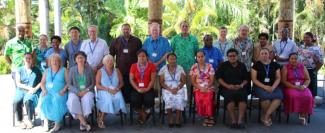
Des experts en oto-rhino-laryngologie (ORL) et audiologie de 6 pays insulaires du Pacifique, ainsi que leurs partenaires d’Australie et de Nouvelle-Zélande, ont pris acte hier des progrès accomplis en matière d’ORL et d’audiologie et défini un plan pour le développement futur de ces services de la région.
(article complet disponible en anglais uniquement)
Medical specialists highlight need to improve Ear, Nose Throat and Audiology Clinical Services in the Pacific
Ear, Nose, Throat & Audiology experts from 6 Pacific Island Countries (PICS) and partners from Australia and New Zealand successfully reviewed their Ear, Nose Throat (ENT) and Audiology regional progress and mapped out a plan for the future development of ENT & Audiology services in the region, in Nadi yesterday.
The 3rd Pacific Ear, Nose, Throat & Audiology Group (PENTAG) meeting created a platform that allowed dialogue between 12 ENT surgeons, nurses and other ENT specialists from these 6 PICs.
Ear disease and hearing loss are significant public health issues and their global importance is recognised by the recent World Health Assembly Resolution (WHA70.13) for the Prevention of Deafness and Hearing Loss, agreed in 2017.
According to data presented by ENT Specialist, Dr Chunghyeon Oh, Fiji alone recorded 4,213 ENT cases, out of which 276 severe cases went through operations. The numbers are a tip of the iceberg and are expected to be much higher than reported as there are no ENT clinics in the densely populated areas of the western and northern divisions.
Dr Belin Kafoa, from the Clinical Services Program (CSP) at the Public Health Division explained that “this meeting is a great platform for member countries and partners to discuss the ENT & A issues, challenges and possible solutions in the region. A Regional PENTAG survey was discussed at the meeting and will be conducted later this year to guide future ENT & A decisions and resource allocation.”
The two-day meeting highlighted the alarming number of ENT cases, the dire need for basic ENT & A equipment and the lack of ENT & A workforce to treat people in the participating countries.
“Despite the limited resources we have in our ENT Clinic, I have seen 2,225 cases and 42.9% of that are ear infections last year, said Dr Sione Pifeleti, General Surgeon in Samoa.
He further elaborated that “through the 3rd PENTAG meeting, I have realised that this problem can be tackled through solid partnership with other Pacific Island Countries and other partners, in terms of knowledge exchange”.
In November 2015, at the request of Pacific Island Countries and with assistance from Australia’s Department of Foreign Affairs & Trade (DFAT), the first meeting of Pacific Ear, Nose, Throat & Audiology Group (PENTAG) was convened to explore ways to strengthen ENT and Audiology services in the Pacific.
A medium-term Plan for the region was developed which focused on estimating the burden of disease in countries and the region and the resources needed to address it, and gradually strengthening country capacity and systems to provide and monitor ENT and Audiology services.
The Pacific Community facilitated the PENTAG meeting in partnership with the Royal Australasian College of Surgeons (RACS) Pacific Islands program (PIP), the Audiology and Global Health Program, at the University of Auckland & interested New Zealand based ENT Surgeons and Audiologists, with ENT doctors and nurses from Fiji, Kiribati, Samoa, Solomon Islands, Tonga and Vanuatu to review their progress and to map out plans for the future development of ENT in the region.
The outcomes the PENTAG meeting will be further discussed at the Heads of Health meeting from 3 to 4 April in Nadi, Fiji.
Media contacts:
Dr Berlin Kafoa, Team Leader - Clinical Services Program (CSP), PHD, SPC | E: berlink [at] spc.int (berlink[at]spc[dot]int)
Sonal Aujla, Communications Assistant, SPC | E: sonala [at] spc.int (sonala[at]spc[dot]int)
About Us:
The Pacific Community (SPC) is the principal scientific and technical organisation in the Pacific region, proudly supporting development since 1947. Learn more at: www.spc.int
